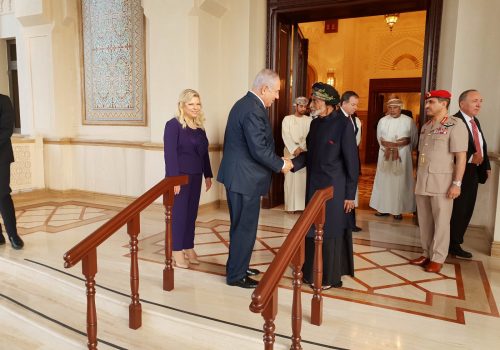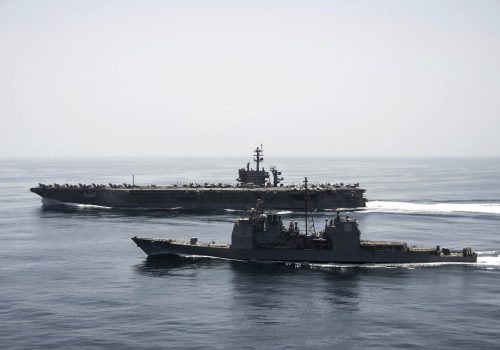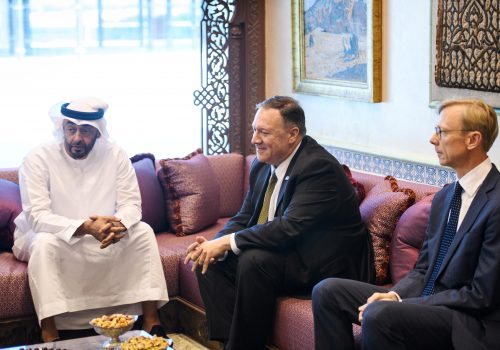Gulf states should defend their sea lanes: Here’s how
The United States has long been the principal provider of leadership, organization, and forces that ensure freedom of navigation in the Gulf. The appetite in the United States for this responsibility is waning rapidly, with both popular opinion and a National Security Strategy that call for less US military involvement in the region due to higher priority demands elsewhere. Despite the increased focus on the challenges by China and Russia, who are currently engaging the US in a “Great Power Competition,” the US should continue to play a role in ensuring freedom of navigation in the Gulf. However, over time, it should play more of a supporting role with the Gulf states themselves providing more leadership and most, if not all of the forces.
Here we provide a summary checklist of the strategic and tactical changes that would need to occur over the next ten years in order for these new roles to evolve and succeed. The basis of almost all of these steps is the development of trust among the parties involved; trust being defined as confidence that the parties can predict the actions of the other involved party or parties fairly accurately when faced with security challenges. Two general categories of trust—strategic and operational—will need to be nurtured.
Strategic trust
On the broad strategic level, trust between states on shared goals is critical. In defending the Gulf sea lanes, our friends in the region will need to be convinced that the US will stand by them in a supportive role, exercising its leadership and organization, even as it relinquishes a primary role. The US will need to trust that Gulf states have a common strategy that defines their interests clearly and points toward the actions necessary to defend them.
It is unlikely that all of the Gulf states or the Gulf Cooperation Council (GCC) as an entity will be able or willing to make the commitments necessary for collective defense of sea lanes—such as the Strait of Hormuz—but trust will, nonetheless, have to be built among those who are. This trust relationship will require clear markers about the relative weight of Saudi Arabia and the United Arab Emirates in joint decision-making and operations.
European and Asian oil importers will need to trust in and contribute to a new system that could build on some of their current participation in Joint Task Forces in the region. Participants in those task forces should consciously harvest and build on the lessons of cooperation learned by these joint operations. These would include both positive lessons such as effective non-US command of some task forces as well as less positive, such as military culture differences that influence force readiness and national caveats that can prevent timely decision-making.
There will need to be a high level of trust that neither the US nor its Gulf partners will take actions that risk unexpected or undesired escalation of conflict with Iran. This is easy to say but hard to do, as we have found out in the last several years. It will require concerted continuous diplomatic focus involving all parties with an interest in protecting freedom of navigation in the Gulf.
Perhaps, most important, the Gulf states will need to continue to probe Iran to determine whether there are effective steps that can be taken to lower the tensions that often lead to problems in the Strait of Hormuz and throughout the Gulf. Gulf states have longstanding lines of communications with the Iranian authorities. The US Fifth Fleet, the region’s maritime commander, has long favored establishing a hotline with Iran to build confidence and offer a path to reduce tensions when crisis arises, for example.
Operational trust
These operational details will be critical to complement a strong strategic framework for a new form of collective security in the Gulf.
Since the US role would contain a large degree of intelligence sharing, there would need to be a high level of trust that a more robust information-sharing paradigm would be protected and used appropriately.
Communications links among and between the Gulf partners and in support of the US and other external parties would need to be improved in order to facilitate tactical decision-making.
On-site (and on-ship) commanders from Gulf states will need to be entrusted with a degree of autonomy to confront rapidly emerging situations. This will likely require some deep cultural changes in Gulf defense establishments.
Gulf forces will need to better coordinate the procurement of ships, aircraft, command and control systems, information sharing systems, and weapons. This equipment will need to be truly inter-operable and will need to replace a number of the platforms currently provided by the US.
How to make progress
The United States is likely to reduce its presence in the Gulf region regardless of the future profile of US political leadership. The US interest should be to make this an orderly process following a plan, while fully recognizing that plans are never perfect and that events will almost certainly intervene in unpredictable ways over the next ten years. The National Security Council, Pentagon and State Department should think about how to approach a gradual new definition of roles in the Gulf and should consult deeply with GCC members to gauge their level of interest, their concerns, and their ability to do what they say they can do should they commit to change.
This will require heavy lifting. Serious US efforts to nudge GCC states into a cohesive security or political entity over at least the last ten years have failed. Even simple interoperability at the tactical level has been difficult to achieve. And, sometimes, the actual results of the US desire for regional powers to take on more responsibility has had very mixed results, as seen in the Saudi and Emirati intervention in Yemen.
The key to making some progress may lie in describing very clear expectations for what the US will contribute to Gulf security long-term and how we expect that to evolve in practice over the coming ten years. Defining the US role will necessarily reveal roles for others. The United States and its allies are perfectly capable of supplying equipment and expertise to help do the job. The problems will likely have more to do with cultivating the political trust among Gulf states that could then seep into the needed operational changes. Our brief checklist identifies some of the steps along the way.
Richard LeBaron is a non-resident senior fellow for the Rafik Hariri Center at the Atlantic Council. LeBaron spent 33 years in the US diplomatic service where he held various senior positions in US embassies in the Middle East, including ambassador to Kuwait. Follow him on Twitter: @RBLeBaron.
John Miller is a retired vice admiral in the US Navy who most recently served as commander of the US Fifth Fleet in Bahrain and head of US Naval Forces Central Command (NAVCENT). He is president of the Fozzie Miller Group and a non-resident senior fellow with the Atlantic Council. Follow him on Twitter: @FozzieMiller
Image: An Emirati official watches members of the U.S. Navy Fifth Fleet as they prepare to escort journalists to tanker at a U.S. NAVCENT facility near the port of Fujairah, United Arab Emirates June 19, 2019. The Fifth Fleet protects oil shipping lanes in he region. REUTERS/Christopher Pike/File Photo


